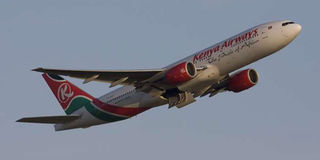How stowaways dice with death

A Kenya Airways plane during flight. In the wheel well, illegal passengers face numerous health risks, many of which are fatal. PHOTO | FILE | NATION MEDIA GROUP
What you need to know:
- According to the US Federal Aviation Administration (FAA), between 1947 and June 2015, 113 stowaway attempts on 101 flights were recorded in the US.
- Many take this desperate journeys for mainly two aims: To travel without paying air ticket, or to travel and enter another territory undetected.
Survivors often have some medical complications such as hearing loss, tinnitus, and frostbite injuries.
Paul Manyasi, 29, from Malava sub-county in Kakamega was on Tuesday identified as the man who fell from a Kenya Airways plane in London on June 30.
His friends and colleagues at a cleaning services firm at the Jomo Kenyatta International Airport (JKIA) say he was looking for greener pastures in Europe.
But Manyasi, a man whose name means ‘herbs’ in Luhya, is not the first person to hide in a Kenya Airways wheel well in recent history.
Many take this desperate journeys for mainly two aims: To travel without paying air ticket, or to travel and enter another territory undetected.
On February 11, 2018, an unidentified African man hid and died in a KQ flight from DR Congo capital Kinshasa to Ukunda, Mombasa County.
He was discovered after emergency landing at the JKIA.
According to the US Federal Aviation Administration (FAA), between 1947 and June 2015, 113 such attempts on 101 flights were recorded in the US.
Of these 113 people, 86, 76 percent, died.
- MANYASI'S TREACHEROUS TRIP
A non-stop flight time from London to Nairobi is around eight hours 45 minutes.
The fastest one-stop flight between London and Nairobi takes close to 11 hours.
However, some airlines could take as long as 37 hours based on the stopover destination and waiting duration.
THE RISKS ARE MANY
Airplanes are pressurised— pumping of air into the cabin of an aircraft to create a safe and comfortable environment at high altitudes— for passengers’ and crew survival.
However, the wheel well does not benefit from this process that ensures safe pressure levels and oxygen circulation.
This means hiding outside the pressurised environment of an airplane's cabin could kill you.
Scientifically, the human body cannot survive the temperatures and lack of oxygen at cruising altitudes.
In the wheel well, illegal passengers face numerous health risks, many of which are fatal, including being mangled when the undercarriage retracts, tinnitus (ringing in the ears), deafness, hypothermia, hypoxia, frostbite, acidosis and finally falling when the doors of the compartment reopen.
The landing gear compartment is not equipped with heating, pressure or oxygen, which are vital for survival at a high altitude.
WHY DO PEOPLE DO IT?
According to FAA, survivors say they are often political refugees hoping to escape the living circumstances in their home countries.
Most stowaways appear to be on flights leaving politically unstable countries for the developed world— mostly Europe or the US.
Some illegal travellers on planes from Africa, like Manyasi, do it for economic gain.
Many hunt for greener pastures and good life in the West.
HOW THEY DO IT
The most common method of stowing away on a flight is to sneak onto the runway while a plane is stationary and to climb the wheels of the plane into the wheel well.
In other instances, stowaways travel either in a cargo hold or in a spare parts compartment, both of which are pressurised, thus survive the flight.
According to a Federal Aviation Administration study from 1996, "certain aircraft contain sufficient space in the landing gear area for a small adult to crawl into the space and hide relatively securely."
DEATH IS AN INCH AWAY
Wheel wells of airplanes are not pressurised, meaning that as the plane ascends, oxygen levels decrease, as well as temperatures.
Some people have died of hypothermia while stowing away; others have literally frozen.
When a plane reaches 22,000ft (6,710m), a stowaway will be struggling to keep conscious as blood oxygen level drops.
NOT ENOUGH OXYGEN
The troposphere, the lowest level of Earth's atmosphere, is only five to 10 miles (8km to 16km) deep but contains 80 percent of the total volume of all of the gases in the atmosphere.
Airplanes flying on long-haul routes routinely fly as high as 36,000 feet (10,972m), a level at which the amount of oxygen is below what humans need to survive.
Most stowaways would suffocate and die even before reaching cruising altitude.
There is just not enough oxygen in the upper-atmosphere to survive.
- IT'S TOO COLD
At cruising altitude, ambient temperatures reach as low as -63 degree Celsius bringing on hypothermia.
At these extremely low temperatures, exposed skin will experience frostbite in just a few minutes, and one's body temperature would quickly drop until hypothermia (and eventually death) set in.
- FALL TO YOUR DEATH
One is also likely to lose consciousness during the flight which increases the chances of falling to your death when the plane touches down.
Some stowaways fall out once the pilots extend the landing gear when the aircraft is on final approach.
- SURVIVAL CHANCES
Survivors often have some medical complications such as hearing loss, tinnitus, and frostbite injuries.
Other risks include decompression sickness, which is often suffered by scuba divers and comes from rapidly changing pressure environments, and that of a nitrogen gas embolism—a bubble of nitrogen gas that can give you a heart attack or a stroke.
- THE CONSEQUENCES
In cases of survival, the person may risk being fined or imprisoned, since it is illegal in most jurisdictions to embark on aircraft, boats or trains as stowaways.
Airports, sea ports and train stations are typically marked as "no trespassing" or "private property" zones to anyone but customers and employees.
Seaports, train stations, and airports often attempt further security by designating restricted areas with signs saying "authorised personnel only".

